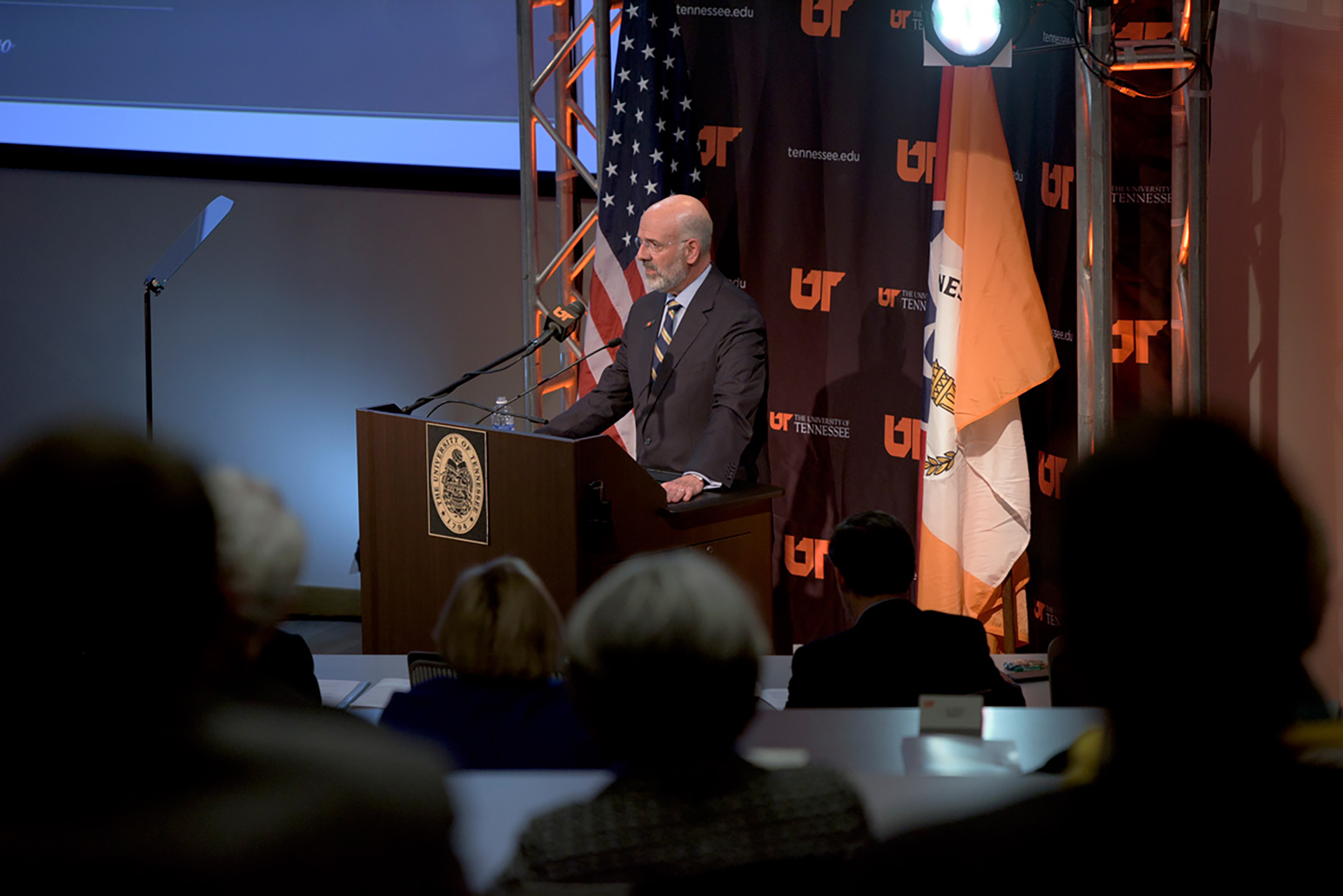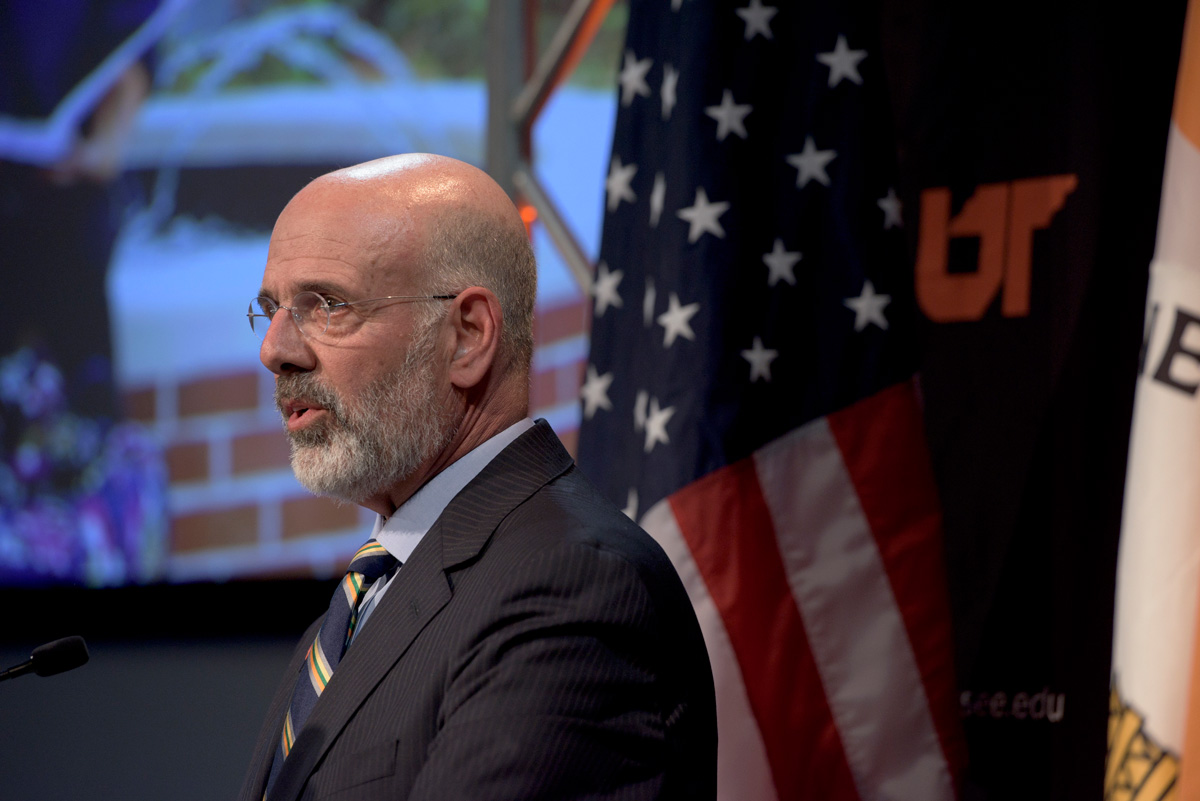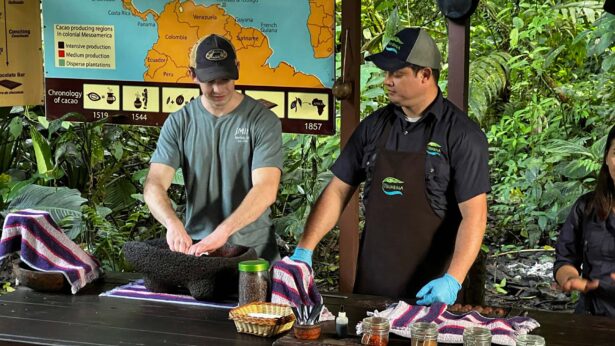By Jennifer Sicking
The university’s seal mutely testified to changing the state through education since 1794 as University of Tennessee President Joe DiPietro walked to the podium in front of bright lights and TV cameras to speak during an unprecedented event about its more recent history.
“The true state of your university is very strong. We are accomplishing more and more each and every day as we educate, discover and connect,” DiPietro says before an auditorium packed with friends, alumni and media, as well as to the hundreds watching online during his first State of the University address in February.
The triad mission of the university moves the state forward, enabling its social and economic progress while meeting the university’s true objective.
“We also exist for a broader and more noble purpose – one that has less to do with generating dollars and cents and more to do with contributing to the development of productive and responsible citizens,” he says.
Each year, the university fulfills its mission when it produces an ever-growing number of graduates, up by 7 percent since 2010. Yet, in education and research, there’s an economic impact, as well. In 2015 alone, UT generated $436 million in research and sponsored projects, reached out to 4.7 million people statewide and raised $303 million in gifts, pledges and bequests. The most recent figures available show a $4.8 billion annual economic impact as the university creates or impacts 75,000 jobs across the state.
The university clearly has much to celebrate even as it negotiates challenges. UT Alumni Association President Alan Ledger (Knoxville ’87) attended the inaugural State of the University event, which he said provided a valued opportunity for engaged stakeholders, because, “It’s important for us to hear directly from Dr. DiPietro.”
And DiPietro spoke candidly.
In 2014, after learning of a projected $377 million funding gap expected to develop during a 10- year span, DiPietro created a Budget Advisory Group to address it. Today, that projection has been cut to $247 million.
“I did not want to see our students and their parents or even the next generation of UT leaders have to shoulder challenges in the future that we had the capacity to address today,” he says.
Tolerance and freedom of expression must co-exist across the UT system if its campuses and institutes are to succeed in their ambitious goals of becoming more competitive nationally, DiPietro says. On diversity, he was direct: “Let me be clear when I say that the University of Tennessee values and is committed to the fundamental tenets of advancing diversity and inclusion.”
The university plans for the State of the University address to become a yearly event. The inaugural presentation was before a live audience at Saint Thomas West Hospital in Nashville—a location highlighting the growing partnership between Saint Thomas Health System and the UT Health Science Center.
‘Only a Fraction’
UT President Joe DiPietro used his State of the University address to highlight successes of each campus and institute from the past year.
“This is only a fraction of who we are and what we do,” DiPietro says.
The UT Health Science Center announced plans in 2015 to build a $40 million facility adjacent to Saint Thomas Health System in Nashville and to increase the number of UT medical residents there from 32 to 200 over the next three years.
A public-private partnership secured $259 million in funding, including a $70 million grant from the U.S. Department of Energy, to establish the Institute for Advanced Composites Manufacturing Innovation, led by UT Knoxville.
The U.S. President’s Higher Education Community Service Honor Roll, which highlights the role universities play in solving community problems and fostering civic engagement, recognized UT Chattanooga with distinction for community service and engagement.
UT Martin operates more off-campus centers than any other public, four-year university in the state and is the UT System’s largest provider of online education.
The UT Institute of Agriculture produced $54.5 million in research, served 3.3 million Tennesseans through educational outreach and provided veterinary services to more than 21,000 animals in 2014.
The UT Institute for Public Service responded to more than 28,000 requests for assistance and trained nearly 15,000 people in government, business and law enforcement in 2015. Its experts helped generate more than $817 million in economic impact during 2015.
President’s Awards
In 2015, President Joe DiPietro established a program to recognize employees whose exceptional contributions fulfilled one of the university’s three mission focus areas: education, research and outreach. The inaugural President’s Awards were announced as part of the State of the University address in February 2016. Each of the winners received a commemorative plaque and a $3,000 cash award.
Julie Hill (Martin ’94), director of percussion studies at UT Martin, won the education category award. UT Martin Interim Chancellor Bob Smith nominated her “for reinvigorating UT at Martin’s music department and attracting students from across the nation.” This award honors accomplishments that enhance educational offerings and diverse learning environments.
Harry “Hap” McSween, Distinguished Professor of Science at UT Knoxville, won the research category award, which honors discoveries and applications of knowledge. UT Knoxville Chancellor Jimmy Cheek nominated McSween for pushing the boundaries of science and innovation into the solar system.
David McBeth, professor of art at UT Martin, won the outreach category award. In his nominating letter, Douglas Cook, UT Martin visual and theater arts department chair, says McBeth uses his art “as a force for good.” This award honors outreach, engagement and service efforts and programs.
To watch the archived webcast of the address or to learn more about the State of the University, visit: tennessee.edu/state-of-ut/.







